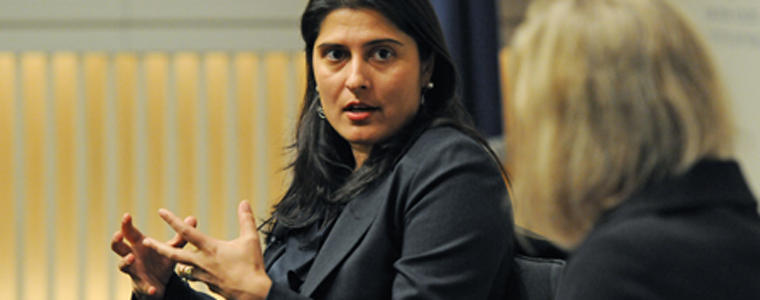Oscar Winning Film Director Talks to USIP About Justice in Pakistan and U.S. Pakistan Relations
Born and raised in Karachi, Pakistan, Sharmeen Obaid-Chinoy won Pakistan's first Oscar for her short documentary, “Saving Face.” On the occasion of Pakistan Day, she answered USIP’s questions about the significance of justice in conflict management.

Born and raised in Karachi, Pakistan, Sharmeen Obaid-Chinoy won Pakistan's first Oscar for her short documentary, “Saving Face.” On the occasion of Pakistan Day, she answered USIP’s questions about the significance of justice in conflict management.
As Pakistan recognizes its National Day, what are the messages this documentary sends to women in Pakistan and around the world?
“Saving Face” follows two survivors of acid attacks as they journey down the path of recovery and struggle for justice. It is an exploration of their strength and bravery as they remain resilient in the face of unimaginable circumstances. It also highlights the Pakistanis who selflessly help these women in their journey, and actualize monumental outcomes. These outcomes show Pakistani women, as well as women all over the world, that change is even possible in the most dire conditions. “Saving Face” testifies on the behalf of Pakistani women that they are engaged in a fight for justice and will not stop until social change is accomplished.
USIP works on managing conflicts and creating more civil societies. How can a film like this be used to help bridge cultural gaps or create a less hostile environment on the ground?
A film cannot achieve social change by itself, but it can be used as a tool that prompts dialogue and consensus. Over the next few months, “Saving Face” will spearhead a national awareness campaign in Pakistan, in which the film will be screened at local colleges, schools and community spaces. Such screenings will be complimented by public service announcements on television and radio, in addition to a robust social media campaign. The narratives in “Saving Face” present audiences with the human side of acid violence and I hope that the stories explored in the film will engage audiences and inspire them to get involved in the campaign.
What is the role of “justice” in any conflict, and in Pakistan, specifically?
Justice often serves as a goal of sorts for those in circumstances that are far from ideal. For the downtrodden members of Pakistani society it sometimes seems like a mirage, existing as a contrast to their unending travails. Therefore when justice is achieved, such as in the case of the survivors in “Saving Face,” it serves as a beacon of hope and inspiration. It encourages other people to work towards their own liberation and assures them that it is attainable.
Where do you see U.S.-Pakistan relations headed?
The United States and Pakistan need to accomplish mutual trust before anything else. In fact, without trust nothing they accomplish will be concrete; their cautious efforts will continue to be in vain. If the foundation of a relationship is not strong it cannot be expected to bear much burden or progress forward. Daniel [Junge, the film’s co-director] and I embarked upon “Saving Face” with a firm level of mutual trust, and it is to this relationship that I attribute a significant part of our success. We both contributed what we do best and thrived off each other.



